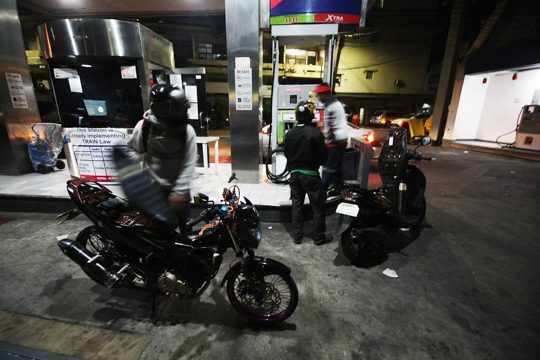SUMMARY
This is AI generated summarization, which may have errors. For context, always refer to the full article.

MANILA, Philippines – Solicitor General Jose Calida defended the tax reform law by saying that the increased oil tax affects mostly rich households, while low-income families are “shielded” by the government’s conditional cash transfer program.
Calida made the argument in a 74-page comment submitted to the Supreme Court (SC) on April 19, a copy of which was released on Tuesday, May 1.
“The Tax Reform for Acceleration and Inclusion (Train) law also reformed the excise tax system by making it more progressive since the richest two million families consume more than half of all oil products and transportation costs of the country,” he said.
It was Calida’s compliance to the SC order which required his comment to Makabayan bloc petition, which wants the the tax reform law struck down because the lower house passed it without a quorum, among other grounds.
The petition also raised questions on the tax reform law, saying the new excise taxes on fuel will burden poor and low-income earners.
Tax on oil
Using data from the Department of Finance (DOF), Calida said it’s the top 10% of Filipino households, or the richest 2 million households with an average income of P113,000 per month, who consume 51% of the country’s fuel.
“By correcting and adjusting the excise tax system, the poor demographic is less affected by the increase in oil excise taxes,” Calida said.
The Solicitor General said the government needed to adjust the tax rates and that not doing so would cost the government P145 billion in revenues.
Calida said the old tax rates on fuel “favored” the rich. because rich households are the biggest consumers of fuel, according to data from the Department of Finance.
Bayan Muna Representative Carlos Zarate, one of the petitioners, called Calida’s claim as “deceptive and misleading.”
This is “because these richest two million who also own the factories and manufacturing companies, the big transportation and logistic companies and other industries will just charge these oil consumption as part of their production costs, [and the] burden will eventually be carried by the consumers, many of whom do not benefit directly even a single centavo from the TRAIN,” Zarate said.
More expensive goods?
The petitioners said that higher taxes on oil would lead to higher prices of goods, transportation fares, and electricity rates, which would hurt the poor.
Calida said the “claim is erroneous.”
“For 2018, the increase in oil excise taxes is projected to have a maximum effect of 0.1% increase in inflation rate on food, 0.1% increase on transportation, 0.0% effect on electricity, and 0.2% increase on other items this year,” Calida said.
He added: “For 2019, the maximum effect of the increase in oil excise taxes on the inflation rate are merely 0.1% on food, 0.1% on transportation, 0.0% on electricity, 0.1% on other items. For 2020, the maximum effect of the increase of oil excise taxes on the inflation rate are as follows: 0.1% on food, 0.0% on transportation, 0.0% on electricity, 0.1% on other items.”
Zarate, however, said Calida cannot hide the “domino and cascading harsh effects” of the tax reform law through “legal acrobatics.”
“The record high inflation rate for the first quarter of the year is exhibit A of this regressive and anti-people TRAIN,” Zarate said.
The Philippines recorded an average inflation rate of 3.8% for the 1st quarter of 2018, its highest quarterly average since 2014.
Calida said that the government also has cash transfer programs which would help ease the burden.
“The government also endeavored to shield the poorest of the poor from possible price shocks that may be brought about by the TRAIN Law through social welfare programs covered by special appropriations under this law and through the unconditional cash transfer program,” Calida said. (READ: Poorest families to get P200 monthly to offset effect of new taxes)
Real effects
If the numbers seem alien to you, here are some of the documented real effects of the tax reform law ever since it was implemented at the start of 2018.
Under the law, drinks with caloric and non-caloric sweeteners are taxed P6 per liter, while drinks with high fructose corn syrup are taxed P12 per liter.
Street vendors sell a cigarette stick now for P7, compared to the pre-TRAIN P5 per stick.
Petitions are pending before the Land Transportation Franchising and Regulatory Board (LTFRB) to increase the minimum fare for jeepneys from P8 to P10, and increased fares for Grab Philippines, citing higher operating expenses because of the tax reform law. – Rappler.com
Add a comment
How does this make you feel?
There are no comments yet. Add your comment to start the conversation.